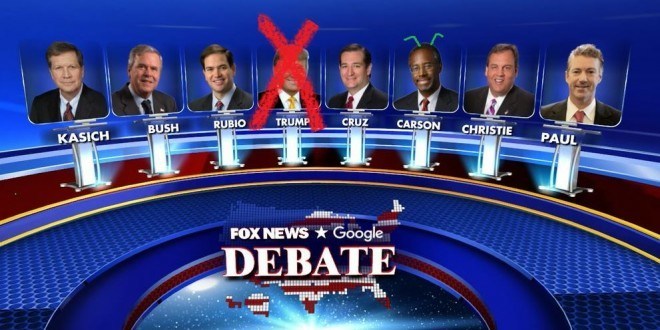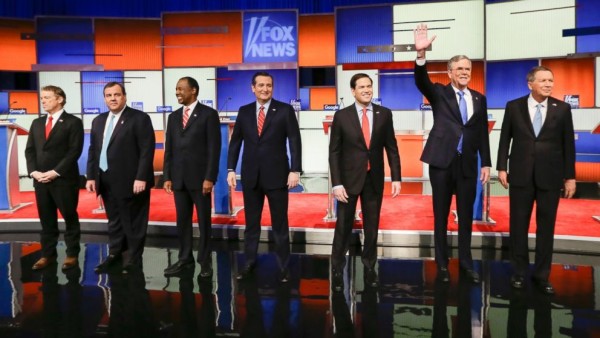
Donald Trump might have skipped out on the seventh 2016 Presidential campaign Republican debate, but you could still feel his presence looming overhead like a ghost. Ted Cruz felt the brunt of it and had his worst performance yet as everyone wound up ganging up on him, which was expected. Trump was easily the biggest winner as his stepping out was a smart calculated (of course, he’ll deny that) move that made him look like even more of a rebel and outsider. These are the actions that have kept him manipulating the media like a pro along with keeping his poll numbers ahead of the rest.
The seven highest-polling Republican presidential candidates took to the stage on Jan. 28 in Des Moines, Iowa, for the last time before the state’s caucuses on Monday. Fox News moderator and anchor Megyn Kelly started the debate by addressing what she called “the elephant not in the room”: Donald Trump. The polarizing businessman announced he would skip the debate ostensibly due to an argument with Fox News over Kelly’s participation in the event.
 Though Trump’s decision to skip the debate dominated headlines beforehand, Trump’s name was somewhat absent from the rest of the evening, according to data collected by our friends at the Inside Gov team.
Though Trump’s decision to skip the debate dominated headlines beforehand, Trump’s name was somewhat absent from the rest of the evening, according to data collected by our friends at the Inside Gov team.
Trump’s name was only mentioned by other candidates eight times throughout the entire two-hour event — mostly during the beginning when moderators posed questions about him. Texas Sen. Ted Cruz’s name was mentioned 12 times, more than any other candidate onstage, followed by Florida Sen. Marco Rubio, whose name was brought up 10 times.
Unlike previous debates in which many candidates said they felt they weren’t given enough time to speak, this seventh debate without Trump gave the other men ample time to speak to their policies and plans. Since this was one of the last major opportunities for the candidates to convince Iowa voters before the caucuses, the presidential hopefuls delivered their messages passionately and pointedly.
InsideGov’s running tally of each candidate’s talk times shows that, overall, Rubio and Cruz spoke the most, with their times totaling 13 minutes, 38 seconds and 13 minutes, nine seconds, respectively.
Cruz spoke the most during the first segment of the debate, but Rubio caught up in the fourth segment when the moderators grilled him about his alleged flip-flopped stance on immigration. Fox aired footage of the senator in 2010 affirming his strong opposition to legalization and citizenship for undocumented immigrants but then pointed out that he later co-sponsored legislation to create a path to citizenship and amnesty for immigrants. Rubio went on to explain that he did not support blanket amnesty and now supports stricter immigration laws.
Besides these two senators, the rest of the Republicans had comparable talk times of around eight to nine minutes. During this time, they addressed questions focused primarily on their characters and electability.
About 21 percent of questions dealt with immigration, leading naturally to conversations and follow-up questions about terrorism and ISIS. Candidates also delved into social issues, focusing primarily on the role of faith and religion in government. New Jersey Gov. Chris Christie stood firm in his opinion that Kim Davis — the county clerk in Kentucky who denied a marriage license to a same-sex couple — should have followed the law. While stressing the importance of religious liberty in America, Christie also said someone else in her office could grant gay couples marriage licenses. Rubio stressed that the country should embrace its Judeo-Christian roots and that faith would guide his decisions were he elected to office.
On Feb. 1, Iowans pick their preferred candidate in the state caucuses, which officially kick off the presidential primary season. On Feb. 6, Republicans will come together in New Hampshire for the eighth debate of the cycle.

